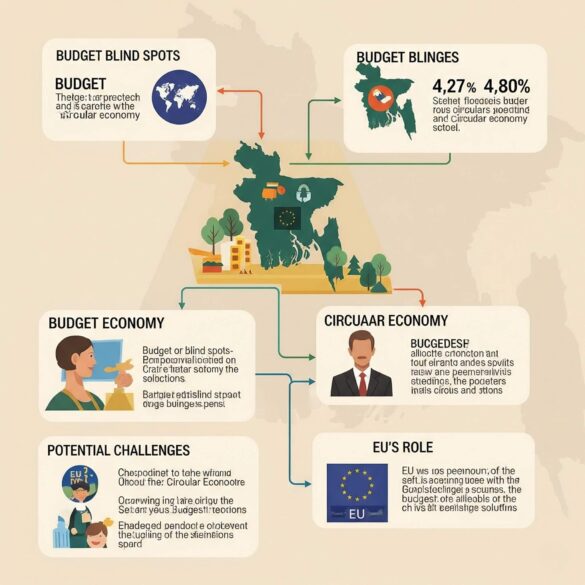An article published recently highlights concerns about Bangladesh’s national budget for 2025–26, stating that it fails to cover important aspects required for promoting a circular economy. As international rivals enforce stricter rules and the European Union sets higher climate benchmarks, specialists argue that the budget misses key incentives and policy backing that could enhance resource use, waste handling, and sustainable development in industry. The EU is moving quickly to enforce its Green Deal regulations and product standards through its Ecodesign for Sustainable Products Regulation (ESPR). These rules are aimed at making products more durable, repairable, and recyclable. As one of the world’s largest textile exporters, Bangladesh must prepare. Its current budget, however, lacks funding for recycling infrastructure, repair centres, and regulatory enforcement—areas that are vital for compliance and competitiveness abroad. Another major concern is the lack of incentives for industries to adopt eco-friendly manufacturing and embrace extended producer responsibility. Circular models—such as collecting, sorting, refurbishing, and reusing materials—require both startup capital and ongoing operational support. Without subsidies or tax breaks, few companies will take the risk to invest in these systems. Those that do may struggle under the weight of imported recycled standards and weak enforcement. Bangladesh also shines a spotlight on its informal waste sector, where many people earn livelihoods by handling textile and plastic waste. Reports show over half a million tons of garment scrap are generated annually. Yet because of poor data collection, weak regulation, and absent safety measures, recycling efforts remain inefficient. As the EU and other major buyer countries introduce tighter import standards, these informal systems face increasing uncertainty and likely loss of market access absent reform. For Bangladesh, this is more than an environmental issue. The country’s $50 billion garments sector—which employs millions—could suffer significant disruptions if it cannot quickly adapt to the EU’s green regulations. That could threaten jobs, exports, and foreign exchange earnings. Experts recommend budget reforms that include setting aside funds for local recycling centres, low-interest green loans, technical support for small and medium enterprises, and proper waste governance. Strengthening producer responsibility laws across plastic, textile, and electronics sectors would align domestic systems with international supply chains. By investing in circular economy infrastructure and equitable waste regulation, Bangladesh can secure long-term environmental benefits while improving industry competitiveness. In short, Bangladesh risks losing both its green export markets and a chance to build resilient, future-ready industries if it does not close the budget gaps. The EU’s growing regulatory muscle offers a clear warning: countries that fail to adapt may be left behind, while those that invest in circular practices could gain early-mover advantages in global markets.
Bangladesh’s Circular Economy: Budget Blind Spots and EU Wake-up Call
49


